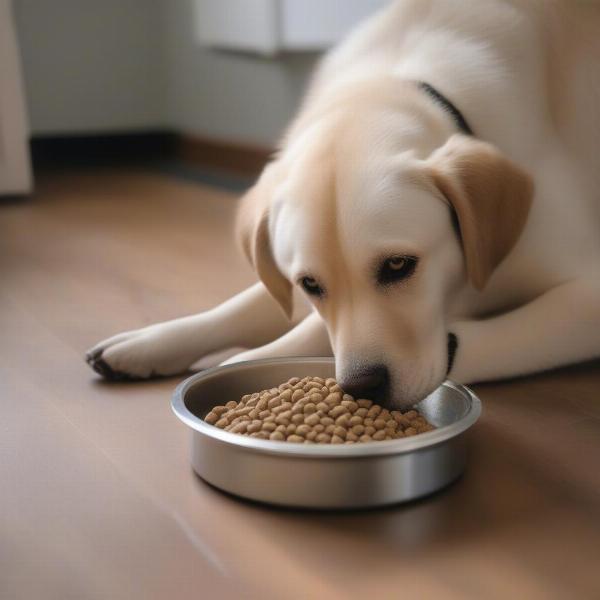The Pyrenees Lab mix, a cross between the Great Pyrenees and the Labrador Retriever, is a large, lovable, and often energetic dog. This guide dives into everything you need to know about this unique mixed breed, from understanding their temperament and training needs to ensuring their health and well-being. If you’re considering welcoming a Pyrenees Lab mix into your family, or simply curious about this fascinating crossbreed, this article will provide valuable insights.
Understanding the Pyrenees Lab Mix Temperament
The Pyrenees Lab mix inherits traits from both parent breeds, resulting in a dog with a unique personality. Labradors are known for their friendly, outgoing nature and eagerness to please, while Great Pyrenees are typically more reserved, independent, and protective. This combination can create a loyal, loving companion that is both playful and watchful. However, individual temperaments can vary, so it’s essential to meet both parents if possible and understand their individual personalities. Early socialization is crucial for a well-adjusted Pyrenees Lab mix, exposing them to various people, animals, and environments from a young age.
Training Your Pyrenees Lab Mix
While intelligent, the independent streak inherited from the Great Pyrenees can sometimes make training a Pyrenees Lab mix a bit challenging. Consistency, positive reinforcement, and patience are key. Start training early and focus on basic obedience commands like sit, stay, and come. Socialization, as mentioned before, plays a crucial role in ensuring your Pyrenees Lab mix develops into a well-behaved adult. Consider enrolling in puppy classes for professional guidance and socialization opportunities.
Health and Care for a Pyrenees Lab Mix
Like all breeds, Pyrenees Lab mixes are prone to certain health issues. Hip and elbow dysplasia, common in larger breeds, are potential concerns. Bloat, a life-threatening condition, is also a risk. Regular veterinary checkups, a healthy diet, and appropriate exercise are crucial for maintaining their well-being. low fat dry dog food might be a good option for this breed to help manage weight and potential joint issues.
What are the common health problems of Pyrenees Lab mix?
Hip and elbow dysplasia, bloat, and certain eye conditions are some potential health concerns in this mixed breed.
Feeding Your Pyrenees Lab Mix
 Pyrenees Lab mix dog enjoying its meal
Pyrenees Lab mix dog enjoying its meal
Providing a balanced diet is essential for the health and vitality of your Pyrenees Lab mix. Choose high-quality dog food formulated for large breeds, considering their age, activity level, and any specific dietary needs. Consult your veterinarian or a canine nutritionist for personalized recommendations. For Great Pyrenees specific dietary information, check out our article on the best dog food for a great pyrenees and the best dog food for great pyrenees puppy.
Exercise Requirements
Pyrenees Lab mixes are energetic dogs that require regular exercise. Daily walks, playtime in a fenced yard, and engaging activities like swimming or hiking are excellent ways to keep them physically and mentally stimulated. Adequate exercise can also help prevent behavioral issues stemming from boredom or excess energy.
Is a Pyrenees Lab Mix Right for Me?
great pyrenees and lab mix dogs can make wonderful companions for the right owner. If you are an active individual or family who can provide consistent training, socialization, and plenty of love and attention, a Pyrenees Lab mix might be a perfect fit. good dogs for men often include breeds like these, as their loyalty and protective instincts are valued.
Conclusion
The Pyrenees Lab mix is a fascinating breed with a unique blend of traits. Understanding their specific needs is crucial for ensuring a happy and healthy life for both the dog and owner. By providing proper training, socialization, a healthy diet, and plenty of exercise, you can enjoy the companionship of this loving and loyal mixed breed.
FAQ
- Are Pyrenees Lab mixes good with children? With proper socialization, they can be good with children, but supervision is always recommended, especially with younger kids.
- How big do Pyrenees Lab mixes get? They are typically large dogs, ranging from 60 to 100 pounds and 22 to 30 inches tall.
- Do they shed a lot? Yes, they are moderate to heavy shedders, especially during shedding season.
- Are they good apartment dogs? Due to their size and energy levels, they are generally better suited to homes with yards.
- How long do they live? Their average lifespan is around 10-12 years.
- Are they easy to train? While intelligent, their independence can make training a bit challenging, requiring patience and consistency.
- Do they bark a lot? They can be prone to barking, especially if not properly trained or socialized.
About ILM Dog
ILM Dog is your premier resource for expert advice on all aspects of dog care, from breed selection and health to training and nutrition. We offer comprehensive guides, product reviews, and practical tips to help you provide the best possible care for your canine companion. Our expertise encompasses various areas, including breed selection, health and wellness, training, nutrition, and grooming. For personalized advice or further assistance, contact us at [email protected] or call us at +44 20-3965-8624.